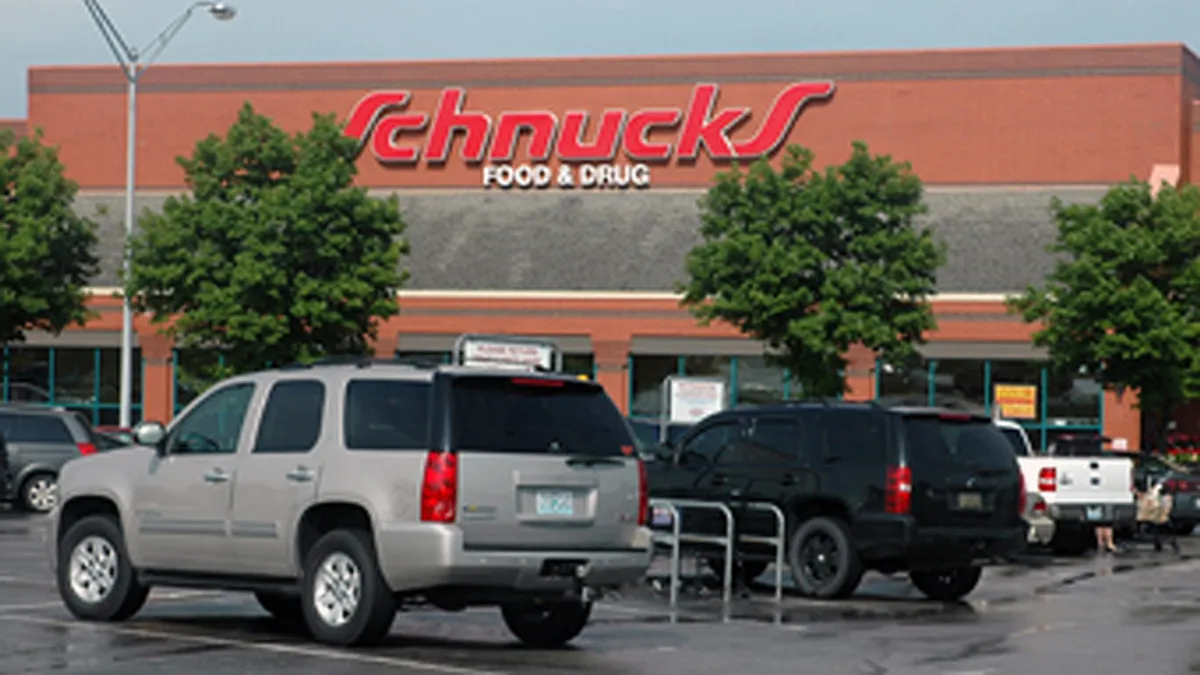Dive Brief:
- Schnuck Markets will open its latest small-format store this fall, according to a company release. The 37,000-square-foot location will go up Warrenton, Missouri — the grocer's first location in that city. The company also operates Culinaria, a 20,000-square-foot store in downtown St. Louis that opened in 2009.
- The new store will focus on an "extensive selection of bakery, produce, seafood, and meat offerings, including in-store cut meat, all offered at competitive prices,” chairman and CEO Todd Schnuck said in the release.
- At the same time, Schnucks plans to close two underperforming stores in Rockford in summer, and will offer 172 workers at those stores positions at the same rate of pay at its other six Rockford-area locations. Low sales and costly operations played into the decision to close them, Winsight Grocery Business reported.
Dive Insight:
Small formats have become a big trend in grocery stores, as convenience remains a top priority for today’s consumer. Chain grocers, facing growing competition from convenience and dollar stores, are smart to recognize the need for options other than big-box operations with vast aisles and countless selections.
The International Council of Shopping Centers found that nearly one out of four millennials shops for groceries three or more times per week, visiting up to six types of grocery stores. That's partly because they want to put the freshest foods possible on their plates. Stores looking to downsize would be smart to focus on freshness, as Schnucks has said it plans to do.
The Midwestern-based chain is certainly not the first grocer to figure this out. Kroger recently opened a Fresh Eats MKT, which features grab-and-go items as well as many grocery staples — such as produce, meat, dairy and bakery items. Meijer also plans to open six small-format urban markets by 2021.
Even Wisconsin-based Festival Foods has gotten into the act, opening a 50,000-square foot operation more than a year ago in Madison. Festival owner and CEO Mark Skogen told The Shelby Report the site was carefully chosen because of the dense population surrounding it. The store features sushi, a salad and hot food bar, extensive deli offerings, as well as in-store dining, a conference room open to the community and in-store childcare.
Large retailers' experiment with small formats has met with mixed success. Walmart’s Neighborhood Market concept never took off, and the retail giant instead seems to be looking at curbside pickup and delivery as a better way to meet customer calls for convenience. Similarly, Ahold Delhaize had nationwide ambitions for its Bfresh concept, but recently announced its halting development.
Target, on the other hand, is rapidly deploying small-format stores in cities across the country, while Whole Foods continues to open new 365 stores.
With millennials now the largest consumer market in the U.S., grocery stores — like other retailers — are scrambling to best meet the shopping preferences of consumers who value convenience over loyalty. There are bound to be missteps along the way, as Walmart and Ahold Delhaize have learned. Large chains, in particular, seem to struggle. Walmart trades primarily on its vast selection, making the transition to smaller space difficult for both the company and its shoppers.
Those considering tinier stores may do well to research their markets carefully and choose products and services to meet the needs of the specific neighborhoods they hope to serve. What works in one area may not work in another. Still, consumers clearly prefer to make quick, frequent shopping trips — a trend no grocer can completely ignore.








